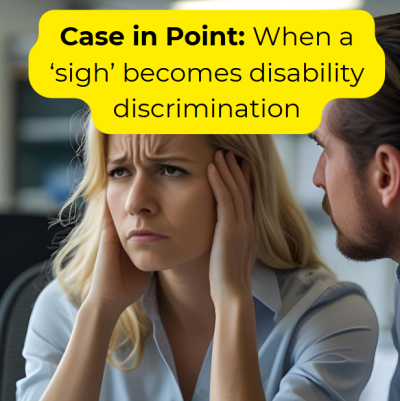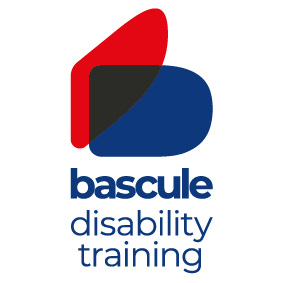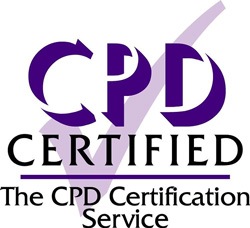Case in Point: When a ‘sigh’ becomes disability discrimination

Microaggressions are something we at Bascule frequently talk about and are sadly something that people with disabilities often experience. One common form of microaggression is non-verbal behaviour, which can be rolling of eyes, staring at someone, patting someone on the head or shoulder in a patronising way, deliberately avoiding eye-contact or conversation – or sighing to indicate frustration.
In this Case in Point feature- we look at a recent UK employment tribunal which ruled that sighing in frustration at a colleague with ADHD amounted to disability discrimination.
The Case:
In a groundbreaking case, this subtle, nonverbal behaviour (and other cumulative failings), were seen to be a breach of equality law as it showed that the employer had neglected to support a neurodivergent employee.
The tribunal found that the company did not make timely adjustments after a staff member’s ADHD diagnosis, which led to discrimination, resulting in the person having workplace stress. The software engineer successfully sued his employer, for disability discrimination.
The staff member faced challenges common among people with ADHD such as inconsistent timekeeping, difficulty focusing, and distractions. These traits, undiagnosed at the time, were not addressed or supported by the company. Once diagnosed, the staff member began medication and took a short period of sick leave. Upon his return, he faced growing hostility from his manager, including criticism of his hours and work habits, and nonverbal expressions of frustration, such as the afore mentioned exaggerated sighs.
This eventually led to a period of leave with work-related stress in February 2023 and the staff member was then dismissed less than a year later. The tribunal found that the behaviour that this person experienced amounted to direct disability discrimination.
The Employment Judge stated: “Had [They] taken steps to identify adjustments required at an earlier stage… this discrimination could have been avoided.”
As well as other claims relating to unfair dismissal and broader disability discrimination, it was also stated by the court that the staff member was let down by their supervisory and senior staff, and the organisation had failed to support neurodiversity.
This case reinforces a critical point. that disability discrimination doesn’t need to be overt to be harmful or unlawful. Managers’ nonverbal behaviours, no matter how subtle, can create feelings of exclusion, stress and shame for employees.
Lessons Learned
Discrimination isn't always overt- Just because we express ourselves subtly through micro-aggressive behaviours to demonstrate negative feelings, it does not deflect from the fact that these behaviours can violate the Equality Act 2010, and could result in a discrimination tribunal.
Microaggressions are HARMFUL - Experts have compared microaggressions to having thousands of very small cuts or having hundreds of mosquito bites, in that you could endure one, but after a multitude, the pain becomes intolerable. Like the person in the case showed, continued microaggressions can cause great stress.
Failure to adjust is often the cause- Reasonable adjustment for the respondent could have eased tensions (for example, the manager complained about time keeping and working patterns)- the manager would have not experienced the frustration of trying to force these patterns that were difficult for the staff member to maintain if flexible working had been put in place.
Tips for Employers
To prevent similar situations, employers should:
- Create a culture that is more understanding of disability
Make disability inclusion a companywide matter, and don’t just roll out some training after an incident or issue. Help staff develop empathy, understanding and knowledge around all disabilities.
- Train managers in Neurodiversity Awareness
Specifically equip your leaders with the tools to recognise and support common traits of ADHD, autism, and other neurodivergent conditions. Help them to know how to manage staff members with a disability, and to successfully determine and implement the right reasonable adjustments. - Create a culture of openness
Encourage open conversations about disability. Create a space whereby staff feel comfortable revealing their hidden disabilities. After all, if microaggressions are noticeably tolerated, staff with non-visible disabilities that have not revealed them, will certainly keep them a secret! - Respond early to signs of struggle
Don’t wait for a formal diagnosis. Adjustments like flexible hours, hybrid roles, quiet workspaces, or task prioritisation can help immediately. Indeed, a tribunal previous case involving the Royal Mail showed that a formal diagnosis is NOT needed, as it was obvious that the employee was struggling and no mitigations were put in place. - Take a Zero Tolerance stance towards microaggressions
Educate staff on what a microaggression is, because a huge percentage of these behaviours are actually expressed unintentionally. If people understand what they are doing, and how damaging their behaviour is, they will think twice… - Help staff respond: Show staff how to politely and non-confrontationally ask questions such as “What did you mean by that?” or “Why do you ask that question?” This can help individuals pause to reflect on their interactions.
- Document and Monitor Adjustments
Keep clear records of agreed adjustments, and regularly check in on their effectiveness and relevance.
Summary
As we often say at Bascule - inclusivity isn’t just about ticking boxes, it’s about creating environments where people can thrive. Addressing these behaviours will also make for more understanding, cohesive, respectful and generally stronger teams.
And the benefits don’t end there. An Australian study found that organisations with strong microaggression training saw a 38% boost in team collaboration and a 35% rise in overall productivity. Similarly, a 2023 study in Japan reported a 39% increase in employee satisfaction among companies that proactively addressed these behaviours.
Even staff retention can be impacted! A recent Canadian study revealed that companies neglecting to address microaggressions had a staff turnover rate 27% higher than those with inclusive workplace cultures.
Need support navigating disability in your workplace?
We help organisations build inclusive cultures that respect and support everyone. Contact us today to find out more…



